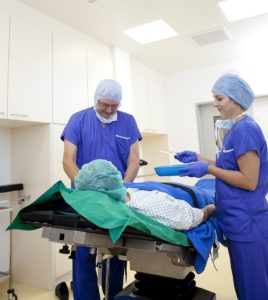
A lung transplant may be a treatment option for some people with idiopathic pulmonary fibrosis. Whether you qualify for a transplant depends on your age and co-morbidities, which means additional health problems you may have. Your ability to do what is required before and after the transplant is also considered. Candidates for transplants must be selected carefully.
If you are considering a lung transplant, the evaluation process to determine if you are eligible may seem overwhelming. Knowing what to expect and understanding the requirements, tests, and procedures involved may help the process be less stressful.
The first step in getting a lung transplant evaluation is a referral from your pulmonologist to a lung transplant program. The transplant coordinator reviews your medical history to make sure nothing immediately jumps out, which disqualifies you from being placed on the transplant list. The next step is to meet with the transplant coordinator and other medical professionals to discuss the lung transplant.
Patients trying to get on the transplant list need to be 100 percent committed. It can be a difficult journey that is filled with some unknowns. It’s essential to consider the risks and possible complications before going forward.
The pre-transplant process includes several medical tests, which are performed to get a complete picture of your health. It alerts your medical team to any problems that may prevent you from getting listed for transplant. In certain cases, problems can be corrected before you are listed for transplant.
Most of the tests performed are done on an outpatient basis. Many of the tests done during a pre-transplant evaluation are tests you are already familiar with and have had performed.
Usually, the medical center doing the lung transplant wants to complete the tests again. But if tests were recent, you may not need to have them repeated. Check with your transplant coordinator for specifics.
Typically, the following tests are part of the pre-transplant evaluation:
Blood Tests
Blood tests are needed to determine your blood type and tissue typing to make sure you are matched with a compatible donor. Additional blood tests are also done to evaluate your general health.
Chest X-ray
A chest x-ray is needed to get a better picture of your lungs and evaluate the extent of your lung disease.
CT Scan
A CT allows for the physician to view your lungs in more detail than a chest x-ray. In some cases, if you had a CT scan within six months of your pre-transplant evaluation, you may not need another one. Talk to your doctor to confirm.
Pulmonary Function Test
A PFT is a series of breathing tests that measure the function of your lungs. Most people with IPF have had multiple PFTs.
Electrocardiogram
An electrocardiogram evaluates your heart’s rhythm. Most people have had EKGs in the past.
Echocardiogram
An echo provides images of the heart’s chambers, which helps evaluate the pumping action of the heart.
Heart Catheterization
This test measures the pressures on the right side of your heart. Most patients also require left heart catheterization which looks for blockages to the blood vessels of the heart.
Patients 50 years and over require a recent colonoscopy and most patients require a comprehensive evaluation for gastro-esophageal reflux (GERD) which includes upper endoscopy (camera study to look at your esophagus and stomach), manemetry (swallowing a small balloon that measures how your esophagus moves), and a 24 hour pH probe (small tube in from your nose to the esophagus to measure the pH of your esophagus over a 24 hour period).
Other Tests
Women generally require a Pap test and a mammogram. Men require a prostate exam. At some point, the transplant coordinator may also decide you need additional testing.
What’s Next in the Lung Transplant Evaluation Process?
After you have had the diagnostic tests, you are notified of your test results. The transplant team will discuss your case and determine whether a lung transplant is appropriate for your situation. If you are approved for a lung transplant, the coordinator will provide you with instructions on what to do while you wait for the surgery.
All the testing, procedures, and requirements to be placed on the transplant list may seem extensive. But the testing is critical to increasing the chances of a successful transplant without complications.
To learn more about lung transplantation for IPF click here.